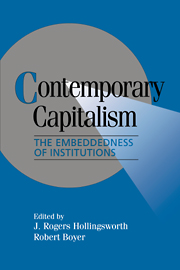Book contents
- Frontmatter
- Contents
- Acknowledgments
- List of Contributors
- Chapter 1 Coordination of Economic Actors and Social Systems of Production
- PART I THE VARIETY OF INSTITUTIONAL ARRANGEMENTS AND THEIR COMPLEMENTARITY IN MODERN ECONOMIES
- PART II HOW AND WHY DO SOCIAL SYSTEMS OF PRODUCTION CHANGE?
- PART III LEVELS OF SPATIAL COORDINATION AND THE EMBEDDEDNESS OF INSTITUTIONS
- Chapter 10 Perspectives on Globalization and Economic Coordination
- Chapter 11 Globalization in Question: International Economic Relations and Forms of Public Governance
- Chapter 12 Clubs are Trump: The Formation of International Regimes in the Absence of a Hegemon
- Chapter 13 The Emerging Europolity and Its Impact upon National Systems of Production
- PART IV CONCLUSION
- Index
Chapter 12 - Clubs are Trump: The Formation of International Regimes in the Absence of a Hegemon
Published online by Cambridge University Press: 05 June 2012
- Frontmatter
- Contents
- Acknowledgments
- List of Contributors
- Chapter 1 Coordination of Economic Actors and Social Systems of Production
- PART I THE VARIETY OF INSTITUTIONAL ARRANGEMENTS AND THEIR COMPLEMENTARITY IN MODERN ECONOMIES
- PART II HOW AND WHY DO SOCIAL SYSTEMS OF PRODUCTION CHANGE?
- PART III LEVELS OF SPATIAL COORDINATION AND THE EMBEDDEDNESS OF INSTITUTIONS
- Chapter 10 Perspectives on Globalization and Economic Coordination
- Chapter 11 Globalization in Question: International Economic Relations and Forms of Public Governance
- Chapter 12 Clubs are Trump: The Formation of International Regimes in the Absence of a Hegemon
- Chapter 13 The Emerging Europolity and Its Impact upon National Systems of Production
- PART IV CONCLUSION
- Index
Summary
INTRODUCTION
Recent years have witnessed a growing debate among students of international relations as to why international regimes form. The purpose of this chapter is to suggest that the formation of regimes is rooted in several types of international failure which prompt the development of governance structures either by states and/or by markets. Building on the recent work on international institutions and transactions cost economics by Yarbrough and Yarbrough, this chapter extends their argument of the study of international regimes (Yarbrough and Yarbrough, 1990).
We argue that state intervention represents one among many possible forms of organizing economic or political activity. Where structural failures exist at the domestic level some form of governance response, either by firms (albeit as decentralized as the competitive market system) and/or by states may be required.
Similarly, at the international level it may be necessary to devise institutions to facilitate cooperation in the presence of structural failures (Caporaso, 1993). Unlike some political economists who narrowly focus on transactions costs as if they were the only kind of market failure (Keohane, 1983, 1995), we identify four different types of structural failure that can contribute to the formation of international regimes: efficiency failures, distributional conflicts, macroeconomic instabilities, and security dilemmas. As strategic rational actors, nation-states may respond to the presence of these structural failures by creating international regimes or some other kind of governance structure. In addition, we argue that, absent a hegemonic leader(s), coalitions of like-minded states, or clubs, may be the principal agent behind regime formation.
- Type
- Chapter
- Information
- Contemporary CapitalismThe Embeddedness of Institutions, pp. 361 - 394Publisher: Cambridge University PressPrint publication year: 1997
- 13
- Cited by

